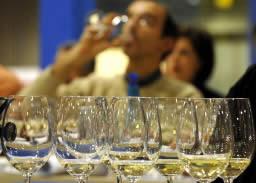The European Union said on Monday that Italian wine was safe to drink after a news magazine exposed a scam involving wine allegedly tainted with toxic substances including acid.
Nina Papadoulaki, spokeswoman for European Union Health Commissioner Andreu Vassiliou, told reporters here: ''The Italian authorities have sent us all the information requested and we can affirm that there is no risk to public health''.
Papadoulaki also denied that the wine at the centre of the Italian investigation contained harmful substances.
''The wine was adulterated with water and beet sugar,'' she said.
The news weekly L'Espresso triggered the alarm last Friday with an article saying that a probe was under way into cheap wine adulterated with toxic substances including fertilizer and hydrochloric acid.
The report said at least 70 million litres of the potentially harmful wine had already found its way onto shop shelves where it was being sold at 70 euro cents to two euros per litre.
Citing details from a judicial probe which has been going on for the past six months, L'Espresso said it was the ''biggest case of food adulteration ever to be uncovered in Italy''.
It said only a third at most of the ''poisoned wine'' was pure while the rest was a ''lethal mixture of water, chemical substances, fertilizer, manure and even a dash of hydrochloric acid''.
It said that only some of the toxic wine had been withdrawn from the market because it was impossible to trace all the bottles.
The report attracted the immediate attention of the EU, which asked the Italian government for information.
The Italian government and prosecutors leading the case have denied L'Espresso's allegations.
Agriculture Minister Paolo De Castro, speaking amid fears of heavy damage to Italy's wine industry, dismissed the case as a ''storm in a wine glass''.
''This is a limited phenomenon and investigations will continue for some months yet... Not a single bottle of this wine has been exported,'' he said last week at Vinitaly, Italy's main annual wine fair.
Top Puglia prosecutor Aldo Petrucci, who is heading the probe, said: ''I can't understand how reporters can write such things when there is no truth to them and they are destined to create alarm''.
Minister for EU Affairs and Foreign Trade, Emma Bonino, said on Monday that ''the front cover of L'Espresso entitled Velenitaly (meaning Poisonitaly and a play on the name of the wine fair) sends out a message that will travel the globe and cause incredible damage''.
Some winemakers' and farmers' unions said they were considering suing L'Espresso.
But the magazine stood by its story, issuing a statement Friday saying that it ''confirmed everything published in its Velenitaly article''.
It also said the wine produced by the two plants at the heart of the probe - Enoagri and Vmc near Taranto in Puglia - was still on the market.
Italian wine producers were already on the defensive last week after a prestigious red Tuscan brand was accused of cutting its Brunello with inferior grapes to boost quantity.
Police seized some 600,000 bottles of 2003 Brunello di Montalcino amid suspicion that it had been made with a grape other than Sangiovese, the only permitted type.
The inquiry, while posing no threat to health, risked damaging the reputation of the wine and its high export value.
Amid the subsequent furore sparked by the L'Espresso report, critics called for more stringent controls to prevent winemakers caught behaving illegally remaining on the market.
The adulterated wine probe was in fact triggered by a September 2007 raid on a maker in Veronello near Verona who was among the producers involved in a 1986 scandal over fatal methanol-tainted wine.
The methanol scandal crippled Italy's wine industry 32 years ago.
A total of 26 deaths were attributed to drinking the tainted wine and dozens of people had to be hospitalised for methanol poisoning, some of whom went blind.
Italy is currently battling another scare over dioxin-tainted mozzarella, which has hit exports of the famed Italian cheese.













